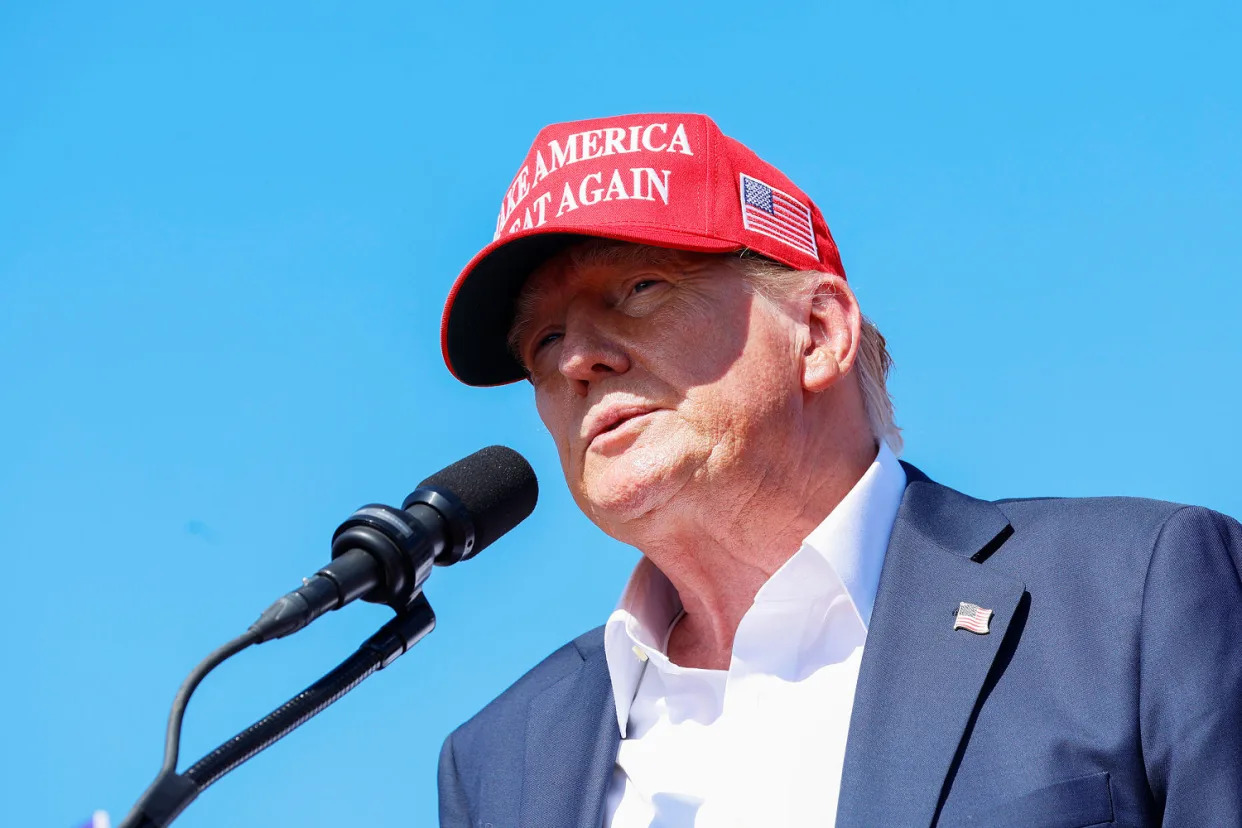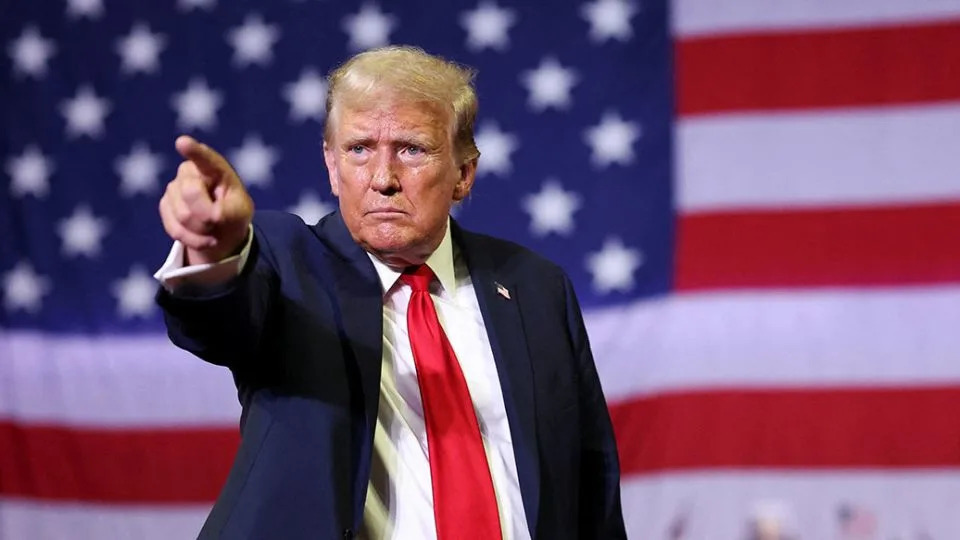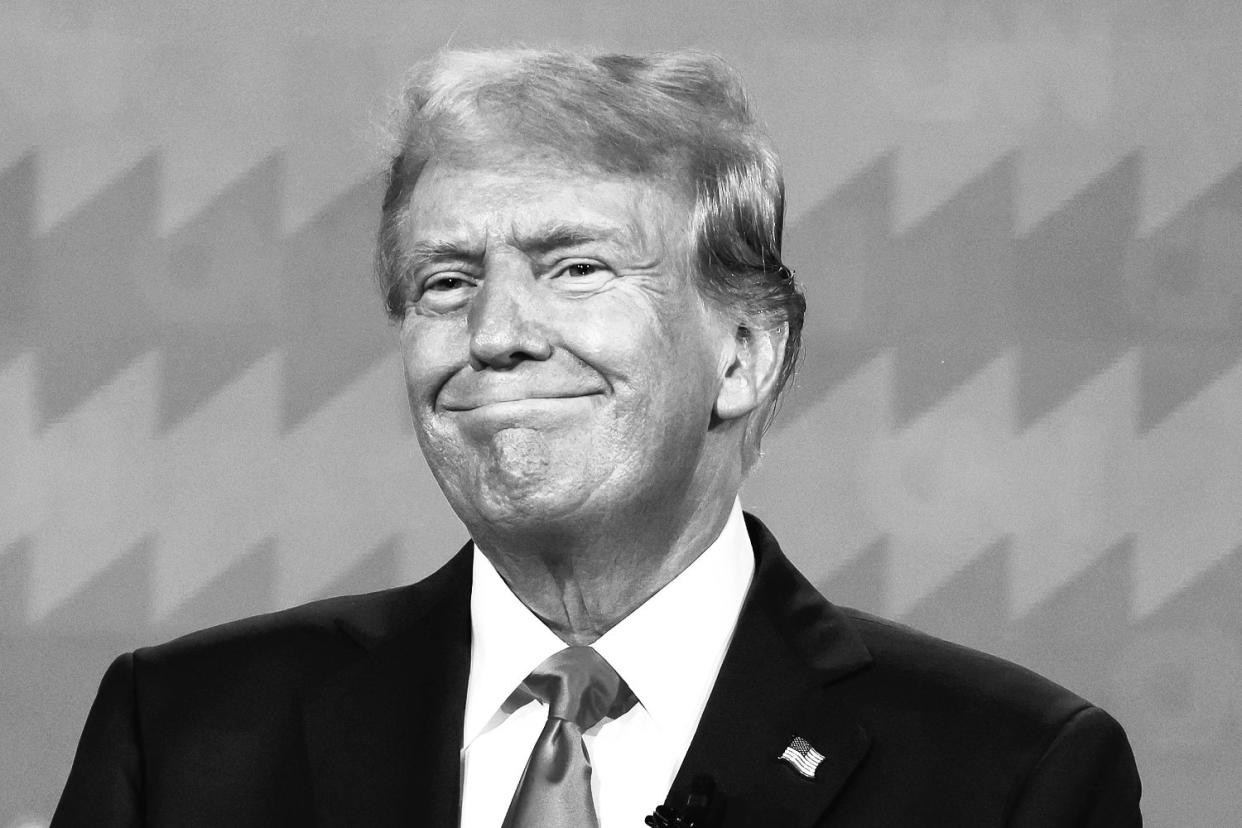The New York Times – Opinion
There Is Apparently No Accountability — Ever — for Donald Trump
By Frank Bruni – July 4, 2024
Mr. Bruni is a contributing Opinion writer who was on the staff of The Times for more than 25 years.

We tell children — or at least we used to — that actions have consequences. What goes around comes around. Watch your behavior. You’ll answer for it someday.
Donald Trump is the living, lying contradiction of that.
He answers for nothing. He’s accountable to no one.
You thought that changed with a Manhattan jury’s verdict five weeks ago? With “guilty” on all 34 counts? How adorable. That only bound most of his supporters even closer to him. Only amplified the theatrical ardor with which Republican politicians pledged their devotion. Only increased donations to his presidential campaign.
Oh, and his sentencing has now been delayed and the conviction itself thrown into doubt, thanks to a supremely reckless Supreme Court.
Immunity, thy name is Trump.
The House of Representatives impeached him twice, but a cabal of collaborators in the Senate chose tribalism over justice and made it all go away. They said that it was up to others to decide if he’d committed crimes, up to others to punish him for those. It was up to them to get re-elected.
The voters repudiated Trump, but he simply pretended it hadn’t happened. He invented dark conspiracies and embroidered wild fantasies to turn defeat — by seven million votes, no less — into supposed victory. Into full-blown martyrdom. He cried “rigged,” he cried “stolen,” he stood by as a mob stormed the Capitol and stood mute as it chanted for his vice president to be hanged. For that ethical savagery the members of his political party lined up dutifully behind him once again. David Koresh never knew loyalty like this.
Trump schemed to steal the election himself. Prosecutors rightly charged him for that. But he has lawyers upon lawyers. He has gall atop gall. He has Fox News, Newsmax, Stephen Miller, Steve Bannon. He has that rogue Supreme Court stacked in his favor, thanks to his and Mitch McConnell’s brazen stacking of it. Its justices have kicked the can so far down the road that it has tumbled into a different galaxy, a different cosmos, one where there’s no moral gravity, where transgressions vanish and worries disappear with the abracadabra of executive privilege.
Trump’s unpopularity with most voters should be a much bigger obstacle for him and a much bigger opportunity for Democrats than it is. Time worked in his favor, as it has so often in the past. It stiffened his political rival’s gait. Weakened his political rival’s voice. President Biden can’t answer Trump’s outrages with optimal passion, ideal precision, laser-guided disdain. He’s Trump’s better in decency, many times over. He’s Trump’s lesser in lung power, and in an age of invective, that matters.
Creditors left in the lurch. Accomplices left holding the bag. (Here’s looking at you, Rudy Giuliani.) Spurned associates. Appeals and delays and delays and appeals. Attorney General Letitia James of New York won her fraud case against Trump, but it doesn’t seem to have hobbled him at all. It’s seldom even mentioned anymore. E. Jean Carroll won her sexual abuse and defamation case. He swaggered (and slandered) on.
Trump has made a career of evasion. No, he has made a legend of it. And while there’s a kind of smarts and a sort of skill in that, it owes more to luck than to brilliance. It owes the most to the perverse freedom that comes with a total lack of conscience — with the readiness to stoke people’s darkest fears and cruelest impulses, to shrug at the damage done, to bilk charities, to run a sham university, to tell little lies, to tell big ones, to place self-promotion and self-preservation so far above everything else that they’re not so much his guiding values as his only ones.
All of that has gone around. When exactly is it coming around?
Perhaps we owe children a new adage, as oversimplified as the ones with which I began but no less true: The shameless shall inherit the earth, while the blameless grapple with the mess they make of it.
The Long Trump Tease
The wait for Donald Trump’s announcement of a running mate will apparently continue into next week.
Let’s not pretend for a second that this is a normal process.
I don’t mean Trump’s hyping of the suspense, as if he’s engaged in some reality-show reveal. I mean this: Whoever is willing to be considered has made that decision despite Trump’s attempt after the 2020 election to get Mike Pence, his vice president the first time around, to ignore the will of American voters and violate the Constitution. Despite Trump’s reported equanimity with calls for Pence’s execution. That bespeaks not only a perilously high tolerance for risk but also a rapacity for power at odds with responsibly wielding it. Which is to say that the reputed finalists for the Republican vice presidential nomination complement Trump beautifully.
But the argument for many of them ends there. J.D. Vance? His singular mix of contemptuousness and smarm should be patented — and then promptly outlawed. Doug Burgum? Proof that plutocrats can be as dull as the rest of us. Tim Scott? An unctuous blur. Tom Cotton? He scares small children and many forest animals.
Keep an eye on Marco Rubio. Sure, he’d have to resign his Senate seat and establish a primary residence somewhere other than Florida to join the ticket, but that’s nothing compared to stepping into Pence’s old cement shoes. And while it took Rubio a while, he has now traveled — now completed — the modern Republican arc from being appalled by Trump to being in thrall to him.
For the Love of Sentences

In The New Yorker, Susan B. Glasser reflected on a micro-tussle toward the end of last Thursday night’s presidential debate: “Is this how democracy dies, in a shouting match between two seniors about their golf game?” (Thanks to Mike Greenwald of Melville, N.Y., for nominating this.)
In The Connecticut Post, Colin McEnroe pondered the president’s proper course: “I’m guardedly a ‘replace him’ guy. Some of you may recall that in 2019, I compared Biden to a Subaru with 310,000 miles on the odometer. ‘America has gotten a lot of use out of Joe Biden, and now it’s time to leave him by the side of the road, unscrew the plates, and walk away,’ I wrote. I was wrong … ish. He turned out to have deeper treads and more left in his tank than I had supposed. But Thursday night was 90 minutes of the ‘check engine’ light flashing desperately in the darkness.” (Holly Franquet, Fairfield, Conn.)
In The Times, Maureen Dowd acknowledged Biden’s gracious response to her tough coverage of him over the years: “He was so un-vengeful, I doubted he was Irish.” (Nancy Jackson, Taos, N.M., and Peter J. Geisser, Cranston, R.I., among others)
In The Atlantic, Caitlin Flanagan evaluated Americans’ attitudes toward NATO over time (and worked in a reference to a recent movie directed by and starring Jerry Seinfeld): “From age to age, a new generation of supporters must be rallied, and that is becoming the 13th labor of Hercules. If the thudding disappointment of ‘Unfrosted’ taught us anything, it’s that young people hate boomer nostalgia. And NATO is the rotary phone of geopolitical alliances.” (Richard Reams, San Antonio)
To return to The Times, Rory Smith explained the hubbub in Britain over the soccer commentator Gary Lineker’s uncharacteristically negative appraisal of England’s performance in the Euro2024 tournament: “To the public, Lineker is supposed to be the embodiment of neutrality. Hearing him be so scathing is akin to seeing David Attenborough pummel a dolphin.” (Ian Wallace, Wilmington, Del.)
Margaret Lyons appraised a beloved television show. “‘The Bear’ has an arms-length relationship to sex and romance, and that was one of its zestiest calling cards in Season 1: plenty of knifing, but no forking or spooning,” she wrote. (Jonathan Gerard, Durham, N.C., and Lee Burdette Williams, Mystic, Conn., among others)
And Margaret Renkl connected her concerns about fireworks to her concerns about America: “The conflation of selfishness with patriotism is the thing I have the hardest time accepting about our political era. Maybe we have the right to eat a hamburger or drive the biggest truck on the market or fire off bottle rockets deep into the night on the Fourth of July, but it doesn’t make us good Americans to do such things. How can it possibly be ‘American’ to look at the damage that fireworks can cause — to the atmosphere, to forests, to wildlife, to our own beloved pets, to ourselves — and shrug?” (George Fero Jr., Chicago)
On a Personal Note

A reader wrote to me a few weeks ago to describe her recent vision loss and to ask for my advice — based on my own, somewhat similar situation — about how best to cope. She’d both read and listened to my memoir on the topic, “The Beauty of Dusk,” but she wondered if I had more to say.
I guess I do, if only because three years have passed since I finished that book. I’ve had additional experiences and reflections.
By her account, her eyesight is much more gravely diminished than mine, raising questions about the work she can and cannot continue to do. I’m hugely blessed — while I need to pace myself carefully and devote extra time and effort to tasks that I once accomplished with relative ease, my professional life remains much the same. So I offer the following observations humbly, knowing that some of them may have wide application and some not.
I cut myself more slack than I used to. I forgive myself for small mistakes (typos related to the sporadic blurring of my vision), medium-size hiccups (the occasional need to request a deadline extension) and what can feel like discourtesy (emails unanswered and invitations declined because of the limits of my focus and energy).
And I resolve, as best as possible, to see that permission as its own kind of gift. Throwing off the yoke of perfectionism or its lesser kinfolk can be liberating. It doesn’t compensate for loss, but it helps enormously with the adjustment to it. There are people who slow down voluntarily; I’ve slowed down involuntarily. That still leaves me in a place not wholly unlike theirs.
Also? I let myself get mad — at judiciously staggered intervals, in rigidly contained increments. I pounded my desk just the other day because the words on my screen began to shimmy and the words on the printouts that I’d made in case that happened were doing their own ugly dance. That necessitated a half-hour break that I didn’t think I could afford. Not fair!
So I seethed, not for a few seconds but for several long minutes, rationalizing that I couldn’t make more productive use of the time and then realizing that this was productive use of the time. It was a warranted exhalation of frustration, a worthwhile release of pressure. I was a laptop shutting down and rebooting. I was a drain being unclogged.
And then I was OK, or at least OK enough for a new keystroke, and then a keystroke after that. One foot in front of the other. It’s the strategy for any journey, slow or fast, long or short.
More in Opinion

Opinion: Why I Won’t Vote
Frank Bruni is a professor of journalism and public policy at Duke University, the author of the book “The Age of Grievance” and a contributing Opinion writer.









